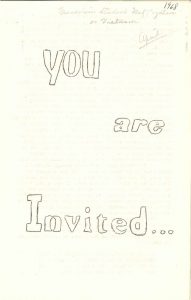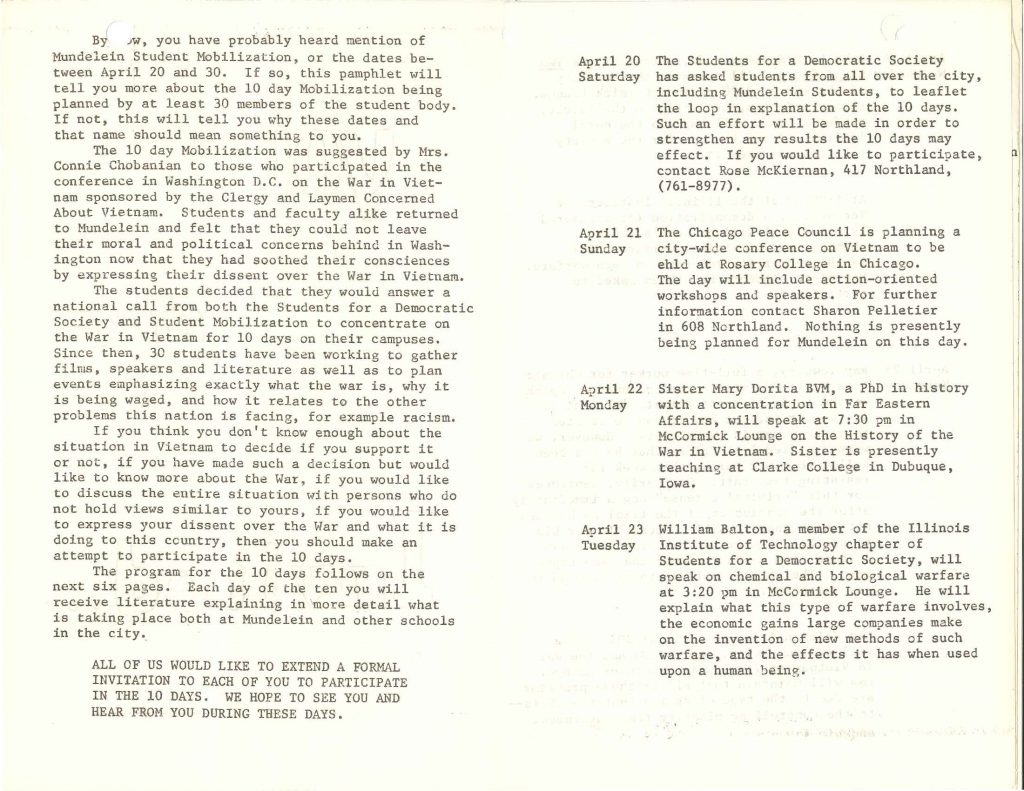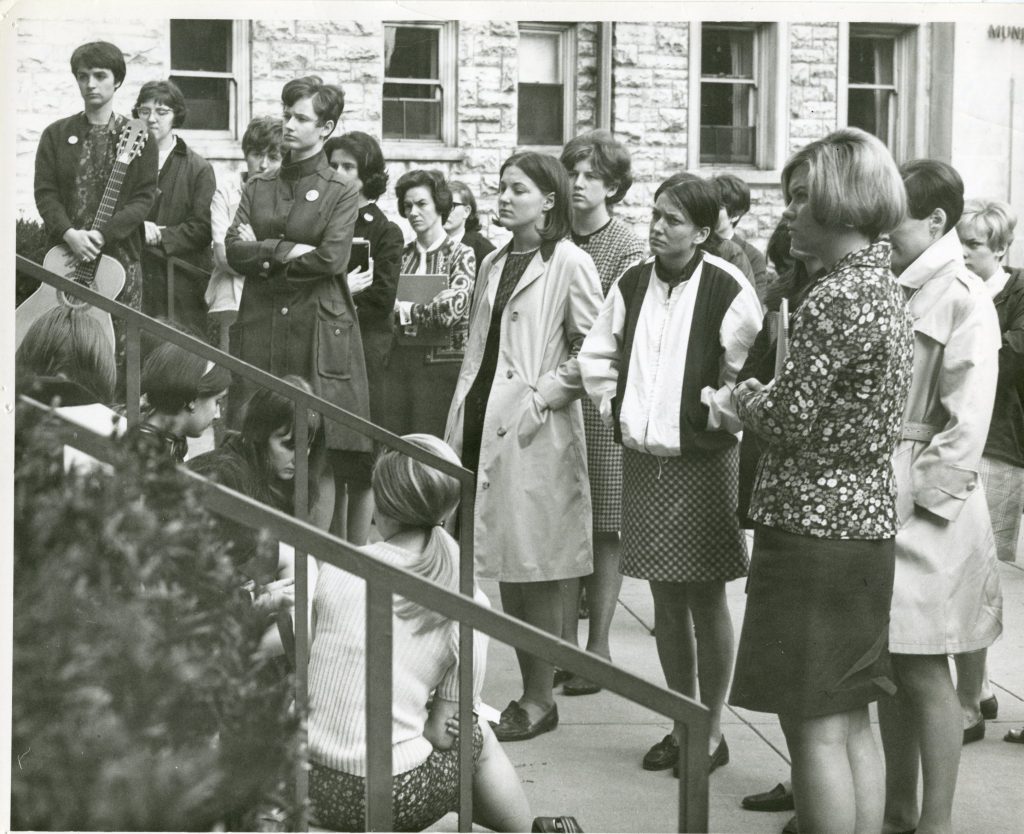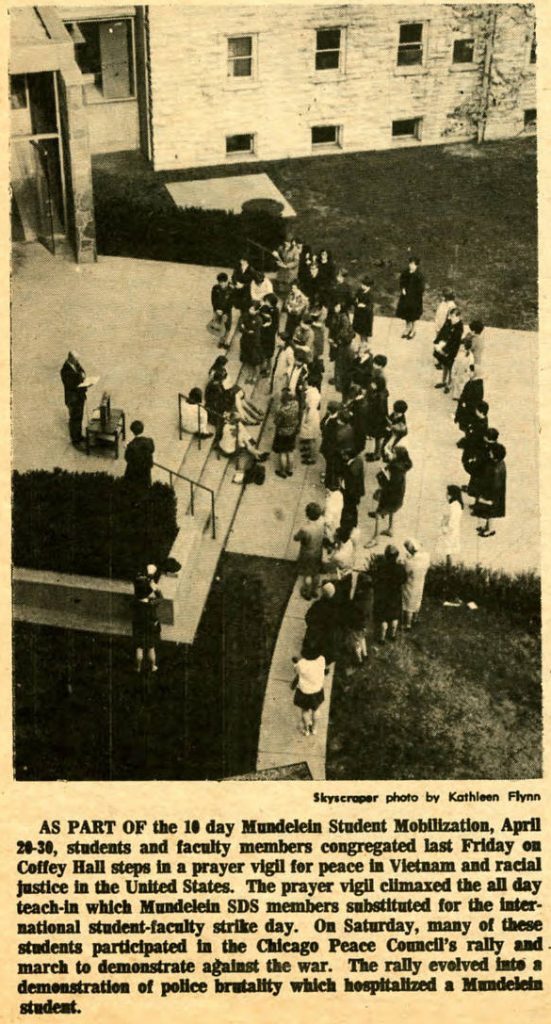As part of an elective for my graduate work in public history, I am taking a class on the Vietnam War. The class focuses mainly on what is happening overseas, but it got me thinking about what Mundelein College* was up to during the time of the Vietnam War. From articles in the Skyscraper as well as letters, invitations, and itineraries in the Mundelein College Collection at the WLA, students took an active interest in the Vietnam War.
Students organized and participated in the Mundelein Student Mobilization. In 1968 the mobilization lasted for ten days from April 20th to April 30th. Several Mundelein College students participated in a conference in Washington D.C. on the Vietnam War sponsored by the Clergy and Laymen Concerned About Vietnam. As written in an invitation for the mobilization after the conference, “Students and faculty alike returned to Mundelein and felt that they could not leave their moral and political concerns behind in Washington now that they had soothed their consciences by expressing their dissent over the War in Vietnam.”[i] The mobilization came out of a national call from both the Students for a Democratic Society and Student Mobilization to focus on the Vietnam War for ten days on college campuses. The ten days included films, speakers, and literature about the war. In addition, a group of students and faculty fasted on bread and tea during the ten days.
On April 27th, as part of the mobilization, Mundelein students participated in a citywide Student Mobilization March held in Grant Park. The march went through the Loop to the Civic Center. Participants demanded the immediate end of the war and the return of US troops. April Parade Committee of the Chicago Peach Council sponsored the march. The march is estimated to have included 7,000 students, clergy, sisters, adults, and children. Police informed participants they had to use the sidewalks and stop at all stoplights. In a Skyscraper (Mundelein’s student run newspaper) article, the march was described as going very slow because of police instructions that included only allowing one person to carry a sign. This prevented some banners form being utilized during the parade because they stretched the full width of the street and required multiple people to carry it.
The Skyscraper reported that many participants felt that police action “appeared designed to create tension.”[ii] The Civic Center plaza was roped off and protesters were once again forced to stay on the sidewalks. Some marchers were arrested for “caulking,” that is, leaving their posters, banners, or signs on the plaza. By this time in the march there was a lot of confusion among participants. Police were making threats and yelling for marchers to hurry up and leave. The Skyscraper reported that anyone who charged to the center of the plaza was “clubbed by police and arrested.”[iii] Mundelein students described their attempt to leave the march but they were unable to get out of the crowd and were surrounded by police. At one point, a policeman pushed a Mundelein student to and she fell. When she attempted to get up, she was kicked in the back. Eventually, the marchers dispersed and most were left confused and fearful about what just happened.
The Skyscraper cited delays in the start of the march and confusion about required permits as errors on the part of the planning committee. There was also no information given to marchers about what would happen once they reached the Civic Center. No matter the problems with the march, one student felt there was no reason for the violence, “No matter who provoked who, the sight of the police hitting kids on the head with their night sticks as the kids ran down the street is the most horrible thing I’ve ever seen.”[iv]
The mobilization march was only one of several events Mundelein College students and faculty participated in during the Vietnam War. From the few records in the Mundelein College Collection about the Vietnam War, it seems that most, if not all, of the events centered on an anti-war and peace agenda. The violence experienced at the citywide mobilization march was unlike the peaceful events held at Mundelein College about the Vietnam War. However, the march demonstrates the mixed feelings about the war that led to one of the most tumultuous times in US history.
*Mundelein College, founded and operated by the Sisters of Charity of the Blessed Virgin Mary (BVM), provided education to women from 1930 until 1991, when it affiliated with Loyola University Chicago.
[i] Student Mobilization Invitation, Mundelein College, April 1968
[ii] Skyscraper, “Brutality mars Loop peace march,” May 3, 1968
[iii] Skyscraper, Brutality mars Loop peace march,” May 3, 1968
[iv] Skyscraper, Brutality mars Loop peace march,” May 3, 1968
Megan is a Graduate Assistant at the WLA and is in the second year of her M.A in Public History at Loyola University Chicago. She is an avid movie-goer and enjoys arts and crafts, live sporting events, and small Midwestern towns.
Loyola University Chicago’s Women and Leadership Archives Blog is designed to provide a positive environment for the Loyola community to discuss important issues and ideas. Differences of opinion are encouraged. We invite comments in response to posts and ask that you write in a civil and respectful manner. All comments will be screened for tone and content and must include the first and last name of the author and a valid email address. The appearance of comments on the blog does not imply the University’s endorsement or acceptance of views expressed.




